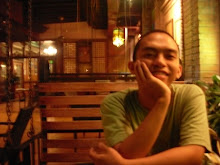 (part three)
(part three)Anger and fear entail the need to control. To feel angry and fearful is to seek for external power, a power that can gain others' attention towards the one who feels weak and insecure. This is a common experience for us. Being enraged and terrified, we have the tendencies to act illogically, as we attack others and protect ourselves from the illusion of danger of not being in control. And often we justify our actions like they suppose to happen for the sake of maintaining our external mandate over things, events, and people.
We are so fixated that we think that life do not change. This is one of the foremost illusions of attachment. Our attachment towards a monolithic view of life renders us unprepared for the constant and sudden uncertainty and inevitability of it. Just as how Ian Malcolm, the fictional mathematician of Michael Crichton's famous thriller Jurassic Park, sees the impossibility of running a dinosaur park smoothly based on accurate calculation of events, we must see that Life bears the same chaotic quality and remains naturally unpredictable. One plus one is not always two, as far as Life is concerned. But we seem to continue to control Life. Like a marionette puppeteer, we attach strings onto Life as if we think that we can make it move the way we want it, without bearing in mind that sooner the strings would snap anytime.
Once our smooth sailing lives jerk in ways we do not expect, instead of understanding the nature of change, we are more inclined to blame others for our problems and sufferings. We are succumbed to the devil's temptation of jumping over the cliff and waiting for angels to save us. Simply put, it's much easier to blame others and act with prejudice. We blame our enemies, government, relatives, partners, kids, authorities, and God. Ultimately, the least that we could do is to blame ourselves. So we end up treating ourselves as victims of fate.
"We are puppeteers who control Life with strings of our ego, and ironically the same strings have tied us into bondage of our own helplessness."
This is the second universal form of attachment: the need to change and control people, things and situations. Since we are so afraid or angry with many changes that we do not like, we force people to submit to our whims and manipulate the course of events in favor of our perceived security that things would always be in order as we desire it. We are puppeteers who control Life with strings of our ego, and ironically the same strings have tied us into bondage of our own helplessness. We paralyze our own freedom as we suppress the flow of change with our limited fixations.
Remember our young monk, who, compelled with his anger, blamed the old monk for his action. He felt that he had lost control when he thought his elder companion broke their rules. He forgot that on any muddy road, change is always possible. Likewise, the road of Life presents us possibilities that sometimes defy our fixated perceptions of what is right or wrong. We cannot control it, but we can go along with it. After all, Life has no rules to follow. Neither the strings of fear nor anger can control Life. Life is freedom at its best, given that we can honor and let it be.
 And we can see that the need to control is like playing God: it's just impossible. We can only live like God, by allowing and non-interfering with a calm and cool attitude. We allow change to take place in the rhythm of nature and in the hearts of humankind. With this kind of consciousness, we do not anymore treat Life like a marionette. Life now becomes a kite: we allow it to fly with freedom. This is the upside of living with strings. The more we let go of our attachment, the more we become connected. In this kind of freedom, we open ourselves to Love more. As we stop fearing and hating, all the more we stop blaming and controlling. They work vice-versa. We allow anyone and anything to flow and grow. In turn, we also allow ourselves. Eventually, we will express Love with no conditions, and, finally, with no strings attached.
And we can see that the need to control is like playing God: it's just impossible. We can only live like God, by allowing and non-interfering with a calm and cool attitude. We allow change to take place in the rhythm of nature and in the hearts of humankind. With this kind of consciousness, we do not anymore treat Life like a marionette. Life now becomes a kite: we allow it to fly with freedom. This is the upside of living with strings. The more we let go of our attachment, the more we become connected. In this kind of freedom, we open ourselves to Love more. As we stop fearing and hating, all the more we stop blaming and controlling. They work vice-versa. We allow anyone and anything to flow and grow. In turn, we also allow ourselves. Eventually, we will express Love with no conditions, and, finally, with no strings attached.(to be continued)





0 comments:
Post a Comment